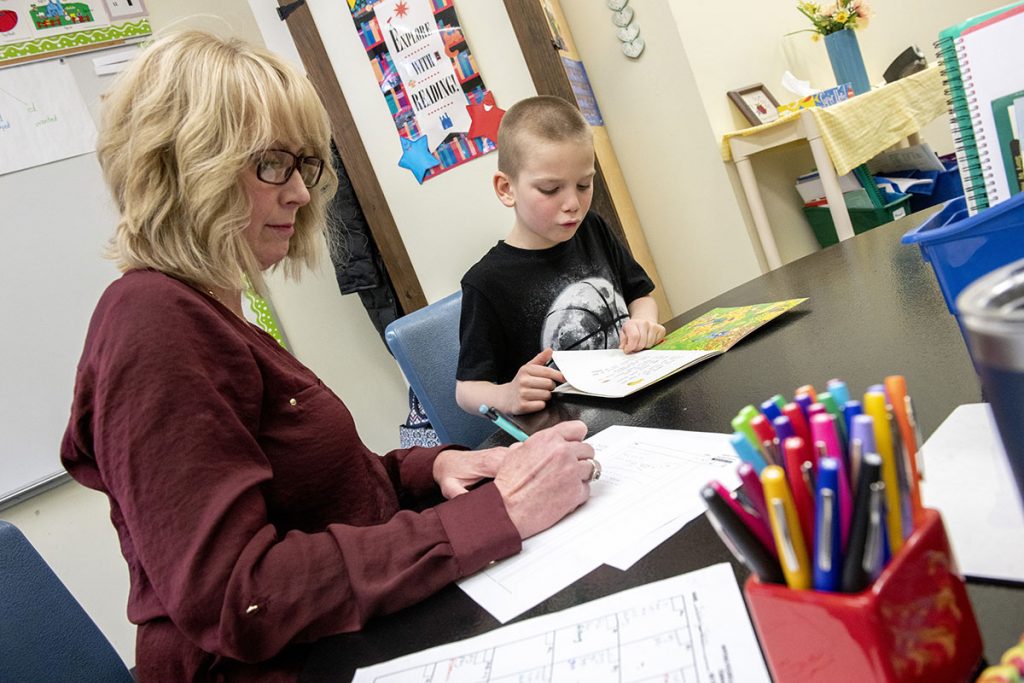Reading Recovery – Young learners benefit from UMaine center

By Sharon Pelletier-Ayer ’94, ’12G
NOTE: This story originally appeared in Maine Alumni Magazine.
Emma Hargreaves recently graduated as valedictorian of her class at Old Town High School, and was named one of just two Maine students in the 2019 class of U.S. Presidential Scholars.
While she will tell you how hard she worked to keep up with all of her Advanced Placement classes, she also credits some one-on-one time with a teacher way back in first grade for her academic success. Back then, Hargreaves was struggling to learn to read, impacting her confidence in the classroom. Her teacher called Hargreaves’s mom and recommended that her daughter take advantage of Reading Recovery, an internationally recognized early literacy intervention program for first-grade students who struggle to learn to read and write.
Literacy is the foundation of learning across all content areas, which makes this work critically important. It’s challenging to learn science, history, or even math if you struggle to read. Through Reading Recovery, students receive individualized instruction over a 12 to 20 week period until they achieve average proficiency for their age. That’s precisely what happened with Hargreaves: the one-to-one guidance she received elevated her literacy skills to an above-average level. Over time she was placed in her school’s gifted and talented program
Hargreaves credits her Reading Recovery teacher as a difference-maker. “She made me feel really capable, and I think that was part of the reason I got better at reading so fast, that she made me feel I could do it.”
Hargreaves’s instructor, along with most Reading Recovery teachers in Maine, received her training through the University Training Center for Reading Recovery (UTC), started in 1993 by UMaine’s College of Education and Human Development. UTC trains the Reading Recovery teachers and teacher leaders through graduate-level coursework and ongoing professional development. Currently Reading Recovery instruction is available in more than 100 elementary schools across the state. More than 37,000 first-grade children throughout Maine have participated in the program.
UMaine’s Mary Rosser, who has been UTC’s director over the last decade and a half, says Reading Recovery works because it addresses a student’s individual needs. The program acknowledges that every student learns differently and that sometimes in order to progress as literacy learners, students need additional, focused instruction to support classroom instruction.
Anne Fortin Wortman ’89 was one of the first teachers in the state to be trained in Reading Recovery practices by UTC. She has been a Reading Recovery teacher ever since and says she loves her work.
“I continue to be energized with every student because they begin the year as struggling literacy learners,” Wortman says, “and within 20 weeks of intense, individualized instruction, they are most often able to read and write at or above the average level in their classroom.”
That seems to be the case for most students who participate in Reading Recovery. According to UTC data, more than 1,000 Maine students participated in Reading Recovery during the 2017-18 school year. By the end of the year, 70 percent of them were reading as well or even better than the average of their peers. Those students who continue to struggle were referred to more intense intervention.
Reading Recovery teachers continually work to optimize their skills with support from the experts at UTC. The center also includes a Comprehensive Intervention model for grades K through 12 as well as the Maine Partnerships in Comprehensive Literacy.
Timothy Reagan, dean of the College of Education and Human Development, sees the work at the UTC as essential to the university’s mission. He points out that it is research-based, theoretically valid, and has impacted a lot of lives.
“There are a huge number of us who believe in it both academically and programmatically, but who also have a personal commitment because our children have been touched.” He noted that his own daughter fell behind in reading as a first-grader, even though she was raised in a literacy-rich home environment. He says Reading Recovery turned her into a reader.
Josh Curtis ’02 says the same about his son who was experiencing learning problems in the first grade. “I know that without support, the gap between him and his peers would have grown. My son is a success, and the support he received helped to make his future bright.”
Experts say that early intervention is essential. It can prevent years of struggle and failure, and send students on a positive trajectory in their academic careers.
That’s part of the reason the Galen Cole Family Foundation was motivated to support UTC’s work. Gary Cole ’72 says his parents, Galen and Suzanne, always valued reading and knew that helping children to learn boosts their confidence. For years the family foundation hosted a gathering of Reading Recovery graduates at Cole Land Transportation Museum in Bangor. Those graduates would take turns reading aloud to the family matriarch, Suzanne Cole.
“The pride each child felt and the twinkle in her eye told me everything I needed to know about the significance of Reading Recovery and why we stay involved year after year,” the younger Cole says of his late mother, who passed away in 2017.
The true impact of this work on students, families, and schools might be difficult to measure, but program graduate Hargreaves knows how it’s affected her.
“It might be a sweeping statement, but I would say almost every opportunity I’ve had since Reading Recovery has in some way been in thanks to the confidence that I built there.
